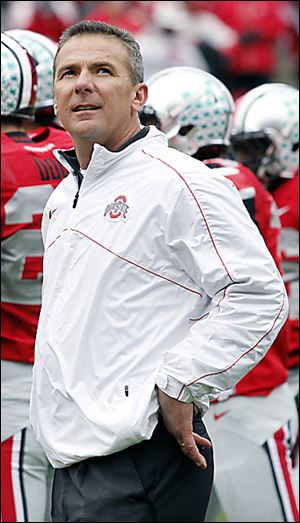
New anything goes recruiting revisions unpopular with Ohio State football coach
2/8/2013
Urban Meyer’s commitment to a balanced life will face a serious challenge by the NCAA soon.
COLUMBUS — Urban Meyer tries to keep his job in perspective. Really, he does.
The coach who burned out after winning two national titles at Florida, led Ohio State to a perfect season in 2012, and signed a top-rated recruiting class Wednesday even has the paperwork to prove it.
Each Sunday last fall, Meyer would tear out of the Buckeyes’ football offices at noon to watch his 13-year-old son, Nate, play CYO football. Running behind one day, he had to find a way to make up time — an effort, he learned later, that did not go unnoticed.
"I was 15 minutes late and getting texts from my wife, ‘You better get here!’ " he said with a laugh. "So I went through a couple of red lights. That’s $50 or whatever it is.”
Yet Meyer’s renewed commitment to a more balanced life is about to face a serious challenge.
As coaches across the country exhaled and reintroduced themselves to their families this week after a fuse-burning run-up to signing day, many were already fretting next year.
The NCAA is taking an ax to the rules that govern recruiting. Part of an effort to simplify a 500-page rulebook and focus more on bigger-picture challenges, the NCAA Division I Board of Directors passed legislation last month that will give college coaches free rein to communicate with high school prospects.
Beginning Aug. 1, the one-call-per-week rule will be no more. Coaches can dial up prospects as often as they want. Nor will there be restrictions on previously banned text messages, mailings, or the number of coaches a staff can have on the road simultaneously.
And those dead and quiet periods that used to give coaches and recruits a break? Gone, too.
"Bad stuff," Meyer said Wednesday. "That’s stuff that we're going to have to address. The Big Ten is going to meet, and I'm putting together a personal letter to all the coaches in America [saying] that I disagree with most of it.
"I would imagine not many people who have recruited wrote those [rules]. ... I keep hearing deregulation. I’m not a big fan of deregulation. I'm a big fan of firm, harsh penalties for people who break rules, not saying, ‘We can’t follow all this stuff so have at it.’ I don’t agree with that at all."
On the idea of ungoverned mailings, he added: "Could you imagine what’s going to be rolling into kids’ driveways, the Fatheads and magnets? It’s nonsense."
In a statement, NCAA President Mark Emmert called eliminating the difficult-to-enforce rules "common sense" — a step that will "allow schools more discretion in decision-making" and refocus the governing body’s "attention on the things that really matter, the core values of intercollegiate athletics.”
But those affected by the rules were not all on board. Nationwide, coaches expressed concern the changes will drive a further wedge between the haves and have-nots and inflict a steep toll on coaches and prospects.
Most notably, the move marks a reversal from the NCAA’s longtime aim to preserve a semblance of normalcy for prospects during the recruiting process.
"First and foremost, it’s going to affect the kids in high school," Nebraska coach Bo Pelini told reporters Wednesday. "The more time a kid is sitting on his phone texting and on the telephone and all the other things, that is [doing] the kids, the high schools, and high school coaches a disservice."
Another upshot: The strain on coaches fearful of being outworked by the competition.
Meyer, for instance, is regarded among the nation’s most relentless recruiters.
Recruiting guru Tom Lemming said, "It doesn’t seem like he sleeps." Lemming recalled sitting in the Jersey City, N.J., office of St. Peter’s Prep School Coach Rich Hansen on the day after Meyer was hired at OSU in November, 2011, when Hansen excused himself to take a phone call.
"It was Urban," said Lemming, a national analyst for CBS College Sports Network. "[Hansen] didn’t have anything for Ohio State, but [Meyer] was laying the groundwork. That must have been one of 1,000 calls he made. How many coaches would go that extra mile? They get paid like they should, but very few will give up their free time to do that. That’s why him and [Alabama’s] Nick Saban are the best coaches in the country."
In six months, the hours will only grow longer.
"Show me a coach who’s a prolific golfer and I’ll show you a lousy recruiter because recruiting has to be their No. 1 hobby now, especially with these new rules," Lemming said. "That means you’re going to spend less time with your family, less time socializing, less time golfing, or making speeches for your university, and a lot of time on the phone with top prospects if you want to get their attention."
Contact David Briggs at: dbriggs@theblade.com 419-724-6084 or on Twitter @DBriggsBlade.